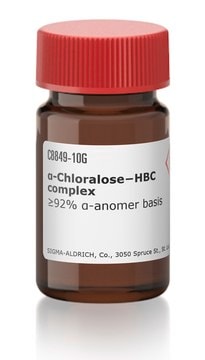23120
α-chloralose
≥98.0% (chloralose, AT)
Synonyme(s) :
1,2-O-(2,2,2-Trichloroéthylidène)-α-D-glucofuranose
About This Item
Produits recommandés
Niveau de qualité
Pureté
≥98.0% (chloralose, AT)
Forme
powder
Activité optique
[α]20/D +17±2°, 5 hr, c = 2% in ethanol
Impuretés
15% Beta-chloralose
Pf
178-184 °C
Solubilité
water: soluble 1 gm in 225 ml at 15 °C
chloroform: slightly soluble
diethyl ether: soluble
glacial acetic acid: soluble
petroleum ether: insoluble
Chaîne SMILES
OC[C@@H](O)[C@H]1O[C@@H]2O[C@@H](O[C@@H]2[C@H]1O)C(Cl)(Cl)Cl
InChI
1S/C8H11Cl3O6/c9-8(10,11)7-16-5-3(14)4(2(13)1-12)15-6(5)17-7/h2-7,12-14H,1H2/t2-,3+,4-,5-,6-,7-/m1/s1
Clé InChI
OJYGBLRPYBAHRT-IPQSZEQASA-N
Vous recherchez des produits similaires ? Visite Guide de comparaison des produits
Actions biochimiques/physiologiques
Composants
Autres remarques
Mention d'avertissement
Danger
Mentions de danger
Conseils de prudence
Classification des risques
Acute Tox. 3 Oral - Acute Tox. 4 Inhalation - Aquatic Acute 1 - Aquatic Chronic 1 - STOT SE 3
Organes cibles
Central nervous system
Code de la classe de stockage
6.1D - Non-combustible acute toxic Cat.3 / toxic hazardous materials or hazardous materials causing chronic effects
Classe de danger pour l'eau (WGK)
WGK 1
Point d'éclair (°F)
Not applicable
Point d'éclair (°C)
Not applicable
Équipement de protection individuelle
dust mask type N95 (US), Eyeshields, Faceshields, Gloves
Certificats d'analyse (COA)
Recherchez un Certificats d'analyse (COA) en saisissant le numéro de lot du produit. Les numéros de lot figurent sur l'étiquette du produit après les mots "Lot" ou "Batch".
Déjà en possession de ce produit ?
Retrouvez la documentation relative aux produits que vous avez récemment achetés dans la Bibliothèque de documents.
Notre équipe de scientifiques dispose d'une expérience dans tous les secteurs de la recherche, notamment en sciences de la vie, science des matériaux, synthèse chimique, chromatographie, analyse et dans de nombreux autres domaines..
Contacter notre Service technique









